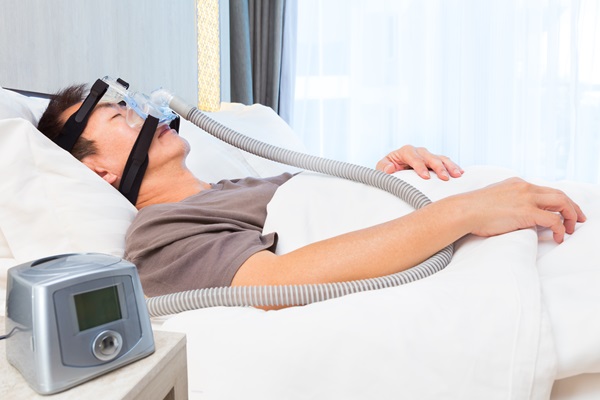What Oral Appliances Are Used in Dentistry to Treat Sleep Apnea?

There are several treatment options available for patients with sleep apnea. For some, CPAP machines may be an ideal solution, although more patients are using dental appliances in place of their CPAP machines. The following is a review of available treatment options for sleep apnea and how to choose the one that works best.
A detailed review of oral appliances for sleep apnea
Two common treatment options for sleep apnea are CPAP machines and mandibular advancement devices. By understanding both options and when one might be preferable to another, you can make the most informed decision possible and find relief from your sleep apnea symptoms.
CPAP machines
CPAP stands for continuous positive airway pressure. A CPAP machine keeps the airway in the back of the throat open by providing constant air pressure to the throat. There are two parts to a CPAP machine: the mask and chin strap combination and the tank, which serves as a filter and humidifier to ensure that the user is breathing in clean air. CPAP machines are effective in treating most cases of obstructive sleep apnea (OSA), but many people become frustrated with the complexity of them, reporting that they are uncomfortable and hard to travel with.
Mandibular advancement devices
Mandibular advancement devices, which are worn in the mouth like a mouthpiece, work by holding the jaw or tongue in the ideal position to ensure that the user’s airway does not collapse while they are asleep. Many people prefer this because they feel that it is more comfortable and easier to use than a CPAP machine. Mandibular advancement devices are effective for many cases of obstructive sleep apnea.
Other available treatment options
Surgery is also a treatment option for obstructive sleep apnea, although most patients and dentists prefer to try less invasive methods first, such as oral appliances. For central sleep apnea (CSA), medication may be the best option.
How to choose the best treatment option
The best way to determine which oral appliance or alternative treatment solution is right for you is to visit with a dentist who treats sleep apnea. They can discuss your symptoms and further explain the pros and cons of each available option. They may recommend a CPAP or create a custom-made oral appliance for you to wear like a mouthguard.
When to visit the dentist for sleep apnea treatment
No one should have to struggle through life dealing with the symptoms of sleep apnea. Anyone who has trouble staying asleep through the night, wakes up with headaches or feels fatigued throughout the day due to sleep deprivation should visit with a dentist to determine if sleep apnea treatment can help.
Contact us today to start the sleep apnea treatment process
Our dental team can help you decide on the best method of sleep apnea treatment. We offer oral appliances and can put together a custom-tailored treatment plan to relieve your sleep apnea symptoms. Call us or send us an email today to get the sleep apnea treatment process started.
Request an appointment here: https://www.jameslakedds.com or call James Lake, DDS at (760) 853-2144 for an appointment in our Yucca Valley office.
Check out what others are saying about our dental services on Yelp: Do I Have Sleep Apnea in Yucca Valley, CA.
Related Posts
Dental oral appliances, also called mandibular advancement devices, can often treat sleep apnea and relieve symptoms. Understanding more about how dental oral appliances work for sleep apnea treatment and how they compare to other treatment solutions can help you decide if treatment is right for you. The days of relying upon your CPAP machine to treat…
Choosing a kid friendly dentist is critical for your child’s dental health. The right dentist understands a young patient’s needs and their development. As a parent, you need to be aware of those big moments in a child’s oral wellness. This will help you keep on top of good oral hygiene at every stage of…
If you are looking to replace several teeth due to decay, infections, disease, injury, or other loss, then you may be looking for your options for a dental implant. The good news is that these procedures have been done frequently, and therefore, a lot of knowledge is known about the process and what to expect.…
While orthodontics is a dental specialty, many general dentists offer orthodontic treatment alongside traditional dental services. This is due to the fact that the appearance and health of one's teeth are connected. A general dentist who offers orthodontic services will have the necessary training and education to address minor to moderate orthodontic treatment, allowing patients…
